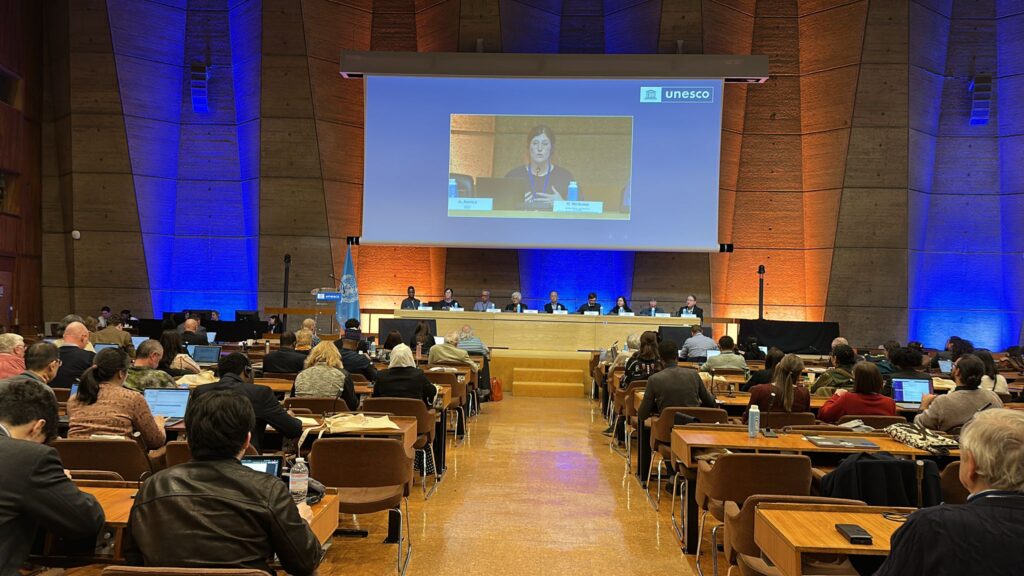A Library and Information Access Perspective on Language Technologies: Input from the Language Technologies for All Conference
04 March 2025
IFLA was excited to join an excellent line-up of experts at the Language Technologies for All – LT4All Conference, held in February 2025 at UNESCO Headquarters.

Claire McGuire, IFLA Policy and Advocacy Manager, spoke both on behalf of IFLA as well as in her capacity as a member of the Information Preservation Working Group of UNESCO’s Information for All Programme – IFAP. She joined a panel on Language Technologies Solutions for Revitalizing Endangered Languages, which explored how technologies ranging from simple tools facilitating cross-linguistic communication to complex machine translation systems can support efforts to preserve and revitalise at-risk languages, including Indigenous languages.
Her intervention highlighted two critical enablers for realising this potential:
- Ensuring the availability of language materials – expanding the corpus and ensuring low-resource language materials are available, usable, finable.
- Increasing access to technology, as well as the support for all to understand and take advantage of the opportunities it offers.
The core message was the same: these technologies need a human interface – including (critically) at the community level – to ensure a just and equitable application.
Availability of language materials
Our intervention stressed that the application of language technology to revitalise endangered languages requires preliminary action to preserve records of that language, as well as to encourage new creation and publications.
Libraries and archives hold vital collections of material in low-resource languages. This can include local and Indigenous knowledge in the form of poetry, folklore, manuscripts, dictionaries, recorded live sessions of song and other audio-visual records.
Actions to preserve, create, and digitise material in low-resource languages, both heritage material and new cultural expressions, is a critical first step to informing any technological solutions. We stressed that libraries need supportive legislation to carry this work out.
IFLA also stressed that an ethical approach to applying language technology must be taken in cooperation with the community concerned. Respect for frameworks such as the CARE Principles of Indigenous Data Governance, which reinforces the rights for the community to engage in decision-making on their data in accordance with Indigenous values and collective interests, is critical.
We stressed that community and education focussed institutions like libraries, including those in universities, are well-suited intermediaries to carry out such cooperative work and help it translate into research and development.
Access to technology
Especially when discussing the Revitalizing of Endangered Languages IFLA stressed the intersectional issue around access. Endangered language communities likely also face other forms of marginalisation, such as a lack of representation in published material and lack of connectivity in general.
IFLA’s 2024 Global Trend Report identified that the digital divide continues to grow, as digital technologies are being unevenly distributed. In parallel, the skills and abilities needed to navigate and thrive in today’s digital landscape are increasingly becoming more complex.
Investment in these areas, and in the institutional infrastructure that can systemically provide these multifaceted means of access, is therefore a critical investment alongside any technological investment.
IFLA and UNESCO IFAP
Across the entire information pipeline, from preservation to digitisation to application in everyday use, libraries can be an interface to ensure these efforts are inclusive, respectful, and accessible to those who can benefit.
IFLA highlighted our work with UNESCO IFAP on upcoming policy briefs to help expand the role of libraries in policymaking on digital inclusion and artificial intelligence. We closed by urging all stakeholders involved in the LT4All Conference to seek out opportunities to partner with librarians (especially from language communities) on policy discussions and in delivering technologies solutions.
Thank you to the conference organisers and to our partners at UNESCO IFAP for the opportunity to be involved in this important discussion.